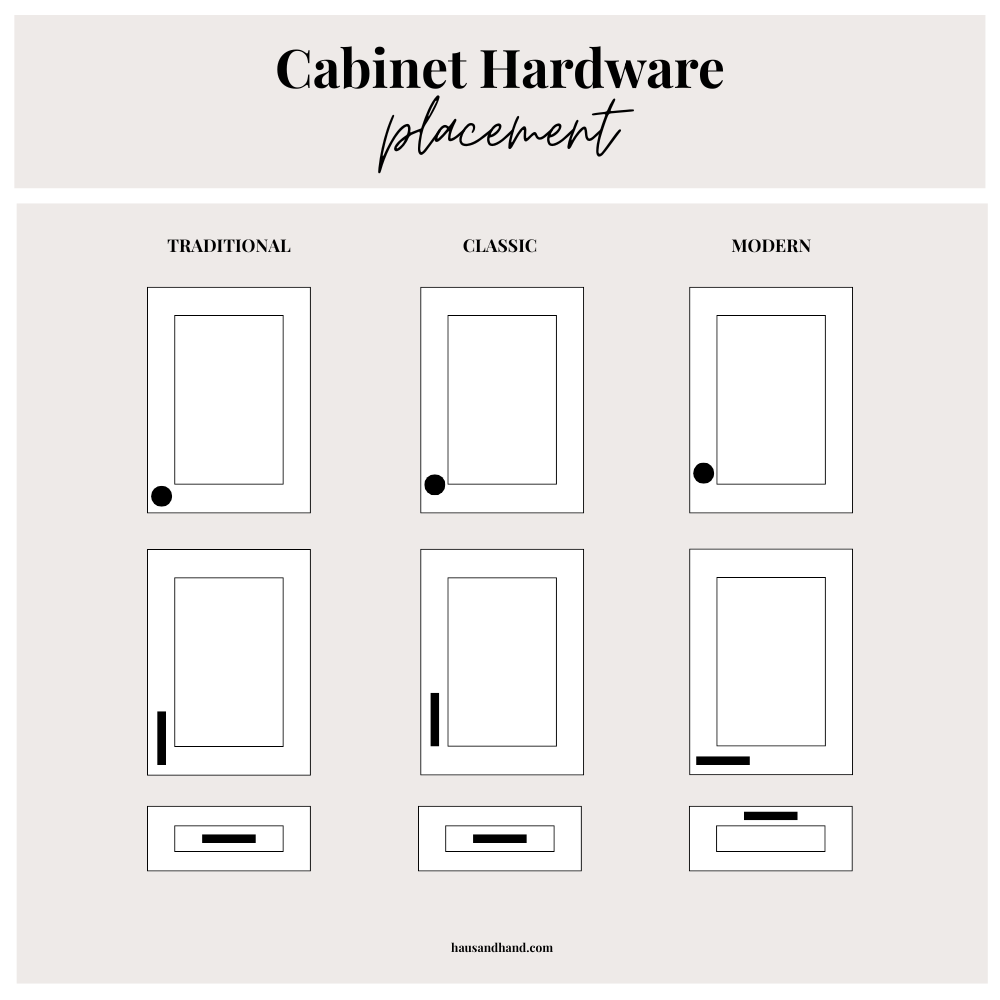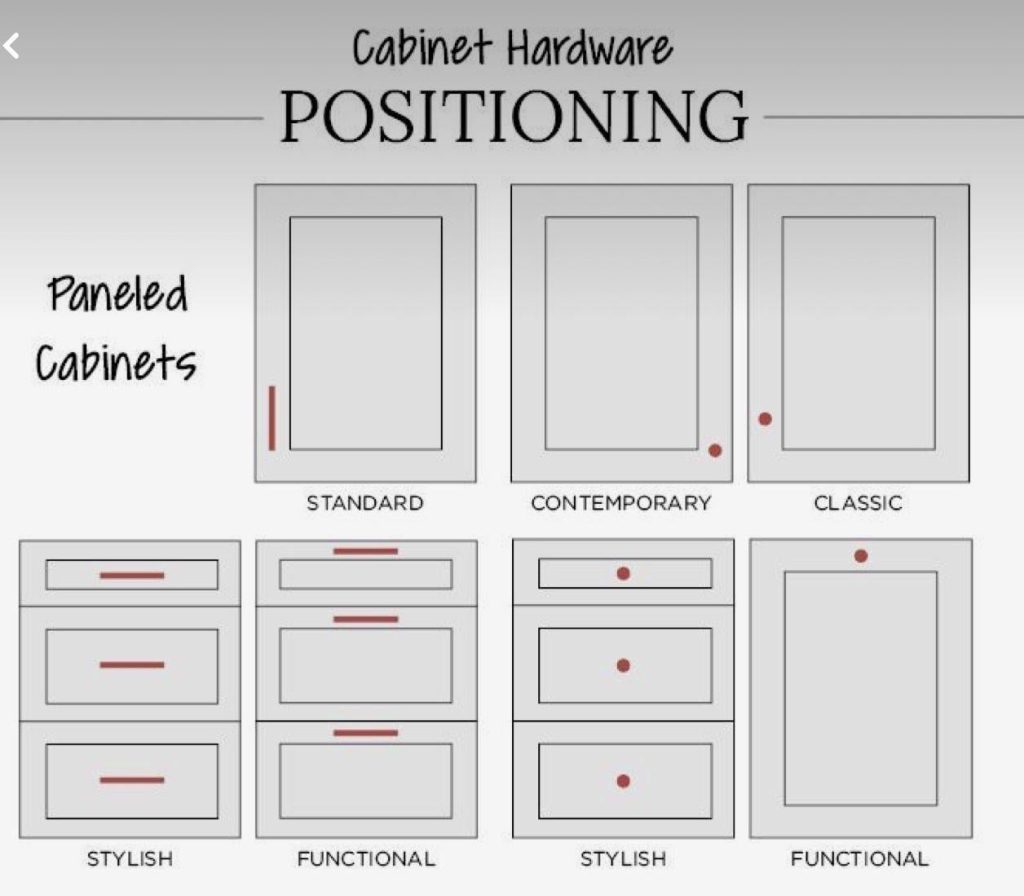Are your cabinet handles placed in the right spot? The position of cabinet handles might seem like a small detail, but it can change how your kitchen or bathroom looks and feels.
When handles are placed correctly, opening and closing cabinets becomes easier and more comfortable. You’ll also notice how much neater and stylish your space appears. If you want to make sure your cabinets work perfectly for you and look their best, keep reading.
This guide will show you exactly where to put your cabinet handles for both function and style.
Choosing Handle Height
Choosing the right height for cabinet handles helps make your kitchen look neat. It also makes opening and closing cabinets easier.
Handle height depends on the cabinet style and who will use it the most. Careful planning can improve both look and comfort.
Standard Heights For Cabinets
Most cabinet handles follow common height rules. These standards help keep your cabinets uniform and simple to use.
| Cabinet Type | Recommended Handle Height |
| Base Cabinets | 3 to 4 inches from the bottom edge |
| Wall Cabinets | 3 to 4 inches from the top edge |
| Tall Cabinets | Centered vertically on the door |
Adjusting For Cabinet Type
Not all cabinets are the same. You may need to change handle height to fit the cabinet’s shape or use.
- For drawers, place handles near the top edge for easy pull.
- For cabinets with inset doors, position handles closer to the door edge.
- For glass or display cabinets, choose handle height that looks balanced.
Considerations For Accessibility
Accessibility is key if someone has limited reach or strength. Handles should be easy to grasp and reach.
Here are tips for accessible handle placement:
- Place handles between 34 and 48 inches from the floor.
- Use larger handles for better grip.
- Avoid placing handles too close to cabinet corners.
Horizontal Vs Vertical Placement
The position of cabinet handles changes the look and feel of your cabinets. You can place handles horizontally or vertically. Each style offers a unique design and function.
Choosing the right placement depends on the cabinet size, style, and how you use the space. Let’s explore when to use each type and how they can work together.
When To Use Horizontal Handles
Horizontal handles work best on drawers or wide cabinet doors. They make it easy to pull open large surfaces. This placement suits modern and minimalist kitchens.
Horizontal handles also help cabinets look wider and more grounded. They fit well under countertops or on lower cabinets for easy reach.
Benefits Of Vertical Handles
Vertical handles are ideal for tall cabinet doors and pantry units. They give a clean, streamlined look to your kitchen or bathroom. Vertical placement guides the eye up and down.
These handles make it easy to grab and open cabinets at various heights. They also save space on narrow doors where horizontal handles might not fit.
Combining Styles For Visual Interest
Mixing horizontal and vertical handles can add style and function. Use horizontal handles on drawers and vertical handles on doors. This creates a balanced and attractive look.
- Use vertical handles on tall cabinets or pantries
- Place horizontal handles on wide drawers and lower cabinets
- Match handle finishes for a unified design
- Mix shapes or sizes for a playful contrast
Handle Spacing And Alignment
Cabinet handles must be spaced and aligned correctly. This improves both look and function.
Proper spacing makes handles easy to use. Good alignment creates a neat and balanced style.
Consistent Spacing Guidelines
Keep the distance between handles the same on all cabinets. This helps the design look clean.
Standard spacing is usually 3 to 4 inches center to center. Measure carefully to keep it even.
- Use a ruler or tape measure for accuracy
- Mark handle positions lightly with a pencil
- Check spacing on all cabinet doors and drawers
- Adjust if any handle looks off-center
Aligning Handles On Adjacent Cabinets
Align handles on cabinets that sit next to each other. This keeps the kitchen visually tidy.
Choose a consistent height and position for handles on every door. This makes the cabinets look uniform.
- Place handles at the same height on all doors
- Use a level tool to ensure straight alignment
- Match handle positions on drawers with doors nearby
- Consider the cabinet style when choosing handle locations
Tips For Symmetry And Balance
Symmetry creates a pleasing look. Balance helps the eye move smoothly across cabinets.
Place handles so they mirror each other on opposite doors. Keep spacing equal on all sides.
- Pair handles on double doors at the same height
- Center handles on single cabinet doors and drawers
- Use equal spacing from edges for a balanced look
- Check alignment from different angles before fixing handles

Credit: plankhardware.com
Handle Placement For Different Cabinet Styles
Choosing the right position for cabinet handles can improve both function and style. Different cabinet styles call for different handle placements. This guide explains where to place handles for popular cabinet designs.
Proper handle placement makes cabinets easier to use and adds to the overall look of your kitchen or room. Read on to learn about placement tips for modern, traditional, and custom cabinets.
Modern Cabinets
Modern cabinets have clean lines and a simple look. Handles on these cabinets are usually sleek and minimal. Placement focuses on usability and maintaining the modern style.
- Place handles near the top edge on drawers.
- For doors, install handles vertically near the outer edge.
- Use long, slim handles to keep a streamlined look.
- Space handles evenly to create balance.
Traditional Cabinets
Traditional cabinets often have more detail and classic styling. Handle placement here supports the ornate look and ease of use.
| Cabinet Part | Handle Placement | Notes |
|---|---|---|
| Drawer | Center of the drawer front | Creates symmetrical appearance |
| Door | Below the top corner on the opposite side of the hinge | Makes opening easy and classic |
| Large Doors | Two handles placed vertically | Balance heavier look |
Custom And Specialty Cabinets
Custom cabinets can vary widely in style and size. Handle placement depends on the cabinet’s purpose and design features.
Consider these tips for custom cabinets:
- Place handles where they feel natural to reach.
- Adjust height based on user preference or cabinet use.
- Use unique handle shapes to match custom designs.
- Test handle positions before final installation.
Tools And Techniques For Installation
Installing cabinet handles needs good tools and clear steps. Proper tools make the job easier and more accurate.
Using the right techniques helps place handles evenly and looks professional. This guide explains key tips for success.
Measuring And Marking Tips
Measure twice to avoid mistakes. Use a ruler or tape measure for precise marks. Mark with a pencil that can erase.
Keep your marks small and clear. Check alignment by comparing all handles before drilling holes.
- Use a flat surface for measuring
- Mark the center of the cabinet door
- Double-check measurements before drilling
- Use a level to keep marks straight
Using Templates And Jigs
Templates and jigs help place handles in the exact spot every time. They save time and reduce errors.
Use a plastic or metal template with holes matching your handle’s screw spacing. Place it on the door and mark through the holes.
- Choose a template that fits your handle size
- Hold the template firmly to avoid slipping
- Use a jig to drill straight holes
- Keep templates clean for better accuracy
Avoiding Common Installation Mistakes
Avoid drilling holes too close to the edge. This can cause the wood to split. Always use a drill bit that fits the screws.
Do not rush. Take time to check each step. Misaligned handles can ruin the look of your cabinets.
- Do not drill without measuring first
- Use a drill guide to keep holes straight
- Do not overtighten screws to avoid damage
- Test handle placement before final fixing

Credit: hausandhand.com
Enhancing Functionality With Handle Position
Cabinet handles play a key role in your kitchen’s functionality. Proper positioning can make your daily tasks easier.
Choosing the right spot for handles enhances both the look and use of your cabinets.
Ergonomic Considerations
Ergonomics matter when placing cabinet handles. Incorrect positioning can cause discomfort or strain.
Consider these ergonomic tips:
- Place handles within easy reach.
- Avoid positioning too high or too low.
- Ensure handles are easy to grip.
Matching Handles To Cabinet Use
Different cabinets serve different purposes. Match handle placement to how often and how you use them.
- Place handles on frequently used cabinets at chest height.
- For lower cabinets, consider horizontal handles for easier pull.
- Use vertical handles on tall cabinets for better leverage.
Improving Ease Of Access
Proper handle position can significantly improve access to cabinet contents. It makes opening and closing more efficient.
| Cabinet Type | Recommended Handle Position |
| Upper Cabinets | Bottom Corner |
| Lower Cabinets | Top Corner |
| Tall Cabinets | Central Vertical |

Credit: hausandhand.com
Frequently Asked Questions
What Is The Best Position For Cabinet Handles?
The best position for cabinet handles is typically the top corner on drawers and the bottom corner on doors. This placement ensures easy access and ergonomic use, improving the overall functionality and appearance of the cabinet.
How High Should Cabinet Handles Be Placed?
Cabinet handles are usually placed 2. 5 to 3 inches from the cabinet edge. This height offers comfort and consistency, making cabinets easy to open while maintaining a balanced look across your kitchen or furniture.
Should Cabinet Handles Be Centered Or Offset?
Cabinet handles are often offset near the edge rather than centered. This positioning allows for better grip and access, enhancing the user experience while keeping the design visually appealing and practical.
Does Handle Position Affect Cabinet Usability?
Yes, handle position greatly affects cabinet usability. Proper placement reduces strain, makes opening easier, and contributes to efficient kitchen workflow. Incorrect positioning can cause inconvenience and reduce the cabinet’s functionality.
Conclusion
Choosing the right position for cabinet handles makes a big difference. It helps cabinets open smoothly and looks neat. Handles placed at a comfortable height make kitchen work easier. Small changes can improve both style and function. Keep your space simple and practical.
Try different spots before fixing handles. Good placement adds charm and saves effort every day. Take time to find the best position for your cabinets. It’s worth the little extra care.








